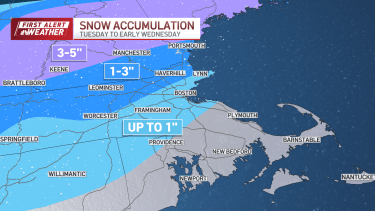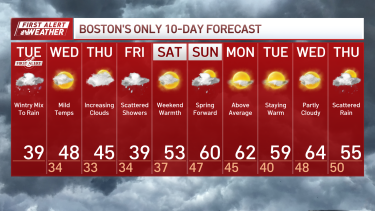Boston, MA
For-profit urgent care clinic proposed in South Boston sparks concern from officials

Elected officials from South Boston say they are against a for-profit urgent care company looking to set up shop a block away from the nonprofit South Boston Community Health Center, a proposal that they fear could harm residents who rely on the existing center.
American Family Care, one of the largest urgent care center operators in the country, has its eyes on bringing a clinic to 457-469A West Broadway, just up the road from the existing community health center which averages 70,000 visits a year.
The close proximity between the two “has the potential to jeopardize the financial stability of South Boston Community Health Center,” City Councilor Ed Flynn said last week before the council approved his order for a hearing on how for-profit health care centers impact nonprofits.
Exact details on what’s being proposed were not immediately available. The city Zoning Board of Appeals is set to hold a hearing on American Family Care’s request on Wednesday.
While urgent care centers provide walk-in services for patients experiencing non-emergency medical issues such as small injuries and minor infections, some of them are for-profit, Flynn said. That means the businesses rely on “investments from private equity firms and venture capital funds,” he wrote in his hearing order.
“Urgent care centers can be attractive investments because they do not have the legal obligations to treat patients if they do not have the ability to pay, unlike emergency departments,” the hearing order states.
But at the same time, Flynn said, more for-profit urgent care centers are popping up across the city, with some being located near nonprofit community health care centers, threatening their “financial viability.”
“Let me be clear, I don’t want to see cuts to programs, services and staff at any of these beloved community health care centers,” Flynn said. “As similar to other development issues, this may be the first shoe to drop in South Boston but it could happen in many of the other neighborhoods across the city.”
American Family Care operates more than 200 facilities across 26 states, treating nearly 3 million patients a year, according to its company website. It looks to have more than 500 clinics nationwide in the next five years.
The company says it is different from other urgent care clinics because it provides “digital X-rays, state-of-the-art diagnostic procedures, electronic medical record keeping,” among other services.
City Councilor At-Large Erin Murphy echoed Flynn’s concerns and said there has been a lack of information about the proposal. She highlighted how the existing community health center partners with city hospitals and how it distributed 35,000 vaccines and tested 14,000 people for COVID-19 during the pandemic.
“I am deeply concerned that the South Boston Community Health Center, as a non-profit, will be at a financial disadvantage on the unequal footing of AFC’s for-profit status,” she said, “and the manifold good the Health Center achieves should not be undermined because of this.”
State Sen. Nick Collins, speaking to the Herald, compared the potential impacts the for-profit urgent care clinic could have on South Boston Community Health Center to the financial crisis plaguing Steward Health Care System.
Steward, the largest private for-profit healthcare network in the country, reportedly considered closing four of its nine Massachusetts hospitals due to its dire financial state. The Dallas-based system allegedly owes $50 million in unpaid rent and is the subject of more than a dozen lawsuits in Massachusetts filed by vendors and employees over unpaid invoices since 2022.
But the company’s executive vice president wrote in a Friday letter to employees that the system has secured a “significant financial transaction” that he says will “help stabilize” the company and save some of its Bay State hospitals from shuttering.

Boston, MA
Charlotte plays Boston on 5-game win streak

Charlotte Hornets (31-31, ninth in the Eastern Conference) vs. Boston Celtics (41-20, second in the Eastern Conference)
Boston; Wednesday, 7:30 p.m. EST
BETMGM SPORTSBOOK LINE: Celtics -6.5; over/under is 214.5
BOTTOM LINE: Charlotte is looking to keep its five-game win streak alive when the Hornets take on Boston.
The Celtics are 27-13 against Eastern Conference opponents. Boston is sixth in the NBA with 46.2 rebounds led by Nikola Vucevic averaging 8.8.
The Hornets are 19-21 in conference matchups. Charlotte is 7-8 when it turns the ball over less than its opponents and averages 15.0 turnovers per game.
The Celtics average 15.5 made 3-pointers per game this season, 2.7 more made shots on average than the 12.8 per game the Hornets allow. The Hornets average 16.0 made 3-pointers per game this season, 2.1 more made shots on average than the 13.9 per game the Celtics allow.
TOP PERFORMERS: Jaylen Brown is averaging 29 points, 7.1 rebounds and five assists for the Celtics. Payton Pritchard is averaging 17 points and 5.8 assists over the past 10 games.
Kon Knueppel is averaging 19.2 points, 5.5 rebounds and 3.5 assists for the Hornets. Brandon Miller is averaging 22.7 points, 5.3 rebounds and 3.6 assists over the past 10 games.
LAST 10 GAMES: Celtics: 8-2, averaging 109.4 points, 50.7 rebounds, 27.1 assists, 6.1 steals and 6.4 blocks per game while shooting 45.7% from the field. Their opponents have averaged 98.5 points per game.
Hornets: 7-3, averaging 117.3 points, 47.8 rebounds, 27.4 assists, 8.5 steals and 4.2 blocks per game while shooting 45.6% from the field. Their opponents have averaged 106.2 points.
INJURIES: Celtics: Jayson Tatum: out (achilles), Neemias Queta: day to day (rest).
Hornets: Coby White: day to day (injury management).
___
The Associated Press created this story using technology provided by Data Skrive and data from Sportradar.
Boston, MA
First Alert: Mix of snow and rain today, then looking ahead to warmer weather

Today is a First Alert weather day. A system to our south is pushing mix of snow and rain into southern New England through this evening and tonight.
For us here in Greater Boston, expect snow to continue spreading over our area through the afternoon/evening commute. In fact, parts our area could see up to 1 to 2 inches of snow accumulation before the sleet and rain move in.
Much of Greater Boston will likely see snow amounts on the lower end. Higher snow amounts are expected toward southern New Hampshire and along and north of outer Route 2. Also, some ice accumulations are possible, up to a tenth of an inch, creating a thin glaze here and there.
Dozens of schools in Connecticut and Massachusetts have already announced early dismissals as a result of the storm.
While this system won’t cripple our area, conditions could still create a mess on the roads during the evening commute through tonight. Be careful while driving. A Winter Weather Advisory remains in effect for parts of our area through early Wednesday morning. High temperatures will be in the mid to upper 30s today. Overnight lows will drop into the low 30s.
We’ll wake up to patchy fog Wednesday morning before the sun returns. High temperatures will be in the upper 40s. We’ll stay in the 40s on Thursday with increasing clouds. But by late Thursday night into Friday, wet weather returns. Some snow could mix with the rain into Friday morning. Highs will be in the upper 30s Friday.

Warmer weather is expected this weekend. Highs will be in the 50s Saturday and possibly near 60 on Sunday.
Boston, MA
Boston police officials dominate the list of highest-paid city workers in 2025 – The Boston Globe

That was more than what every other city department spent on overtime combined, though it was a slight drop from the $103 million the police department spent on overtime in 2024.
High overtime spending inside the police department has long been controversial and a source of frustration for police-reform advocates. Last year’s nine-figure total comes as Mayor Michelle Wu warns of a challenging budget season to come for the city, which is grappling with inflation and the possibility of more federal funding cuts.
In a December letter, Wu told the city council that she instructed city department heads to find ways to cut 2 percent of their budgets in the next fiscal year. She also imposed a delay on new hires. Boston Public Schools Superintendent Mary Skipper has also proposed cutting somewhere between 300 and 400 positions next fiscal year due to budget constraints.
Overall, the city spent about $2.5 billion on employee salaries in 2025, up around 1.5 percent from $2.4 billion in 2024. The city employs roughly 21,000 workers, according to a public dashboard.
In a statement, Emma Pettit, a spokesperson for Wu’s office, attributed the payroll increase to raises, and in some cases, employees receiving retroactive pay, that were part of contracts the city negotiated with its various labor unions.
“We’re grateful to our city employees for their hard work to hold Boston to the highest standard for delivering city services,” Pettit said.
When Wu won her first mayoral race in November 2021, all of the city’s 44 union contracts had expired. Since then, Wu’s office has negotiated new agreements with all of them, and last year, agreed to a one-year contract extension with the Boston Police Patrolmen’s Association, the city’s largest police union.
But as the city heads back to the bargaining table to negotiate extensions or new contracts with others, city leaders should keep cost at the forefront of those conversations, said Steve Poftak, president of the Boston Municipal Research Bureau, a business-backed budget watchdog group.
“As budgets tighten, I’m hopeful that it increases the scrutiny on these collective bargaining agreements,” Poftak said.
The top earner on the city’s payroll last year was Boston Police Captain Timothy Connolly. In addition to his $194,000 base salary, Connolly took home nearly $230,000 in overtime, about $26,000 in undefined “other pay,” and roughly $49,000 as part of a higher-education bonus, for a total of $498,145 in compensation.
Skipper, as BPS superintendent, was the 55th-highest earner among city workers, coming behind 54 members of the police department. She made a total of $378,000 in 2025.
Nearly 300 city employees made more than $300,000 last year. In contrast, Wu made $207,000, though her salary increased to $250,000 this year. More than 1,700 city employees made more than the mayor in 2025.
Larry Calderone, president of the Boston Police Patrolmen’s Association, argued that the high overtime costs in the police department are, in part, a result of understaffing.
The department is short roughly 400 rank-and-file police officers, Calderone said, meaning the department has to pay its staff to work overtime and fill vacant shifts. The average salary for an officer in the BPPA is roughly $195,000, Calderone said.
With several large events approaching, including a Boston-based fan fest around this summer’s World Cup matches and the return of a fleet of tall ships to Boston Harbor, Calderone said most of the members of his union are likely to be working the maximum allowable 90 hours a week.
“We just don’t have the bodies on the street,” he said.
The Boston Police Department and the Boston Police Superior Officers Federation — the union that represents the department’s sergeants, captains, and lieutenants — did not immediately return requests for comment Monday.
Jamarhl Crawford, an activist and former member of the Boston Police Reform Task Force, said while high spending on overtime is not new for the police department, it’s a pressing problem the city should tackle.
The police and fire departments are “essential components of the city and society in general … [and] folks should be getting a fair wage. But it also has to be within fiscal responsibility,” Crawford said.
“In another 10 years,” he continued, “with pensions and everything else, this type of thing can bankrupt the city.”
Niki Griswold can be reached at niki.griswold@globe.com. Follow her @nikigriswold. Yoohyun Jung can be reached at y.jung@globe.com.
-

 World7 days ago
World7 days agoExclusive: DeepSeek withholds latest AI model from US chipmakers including Nvidia, sources say
-

 Massachusetts1 week ago
Massachusetts1 week agoMother and daughter injured in Taunton house explosion
-

 Denver, CO7 days ago
Denver, CO7 days ago10 acres charred, 5 injured in Thornton grass fire, evacuation orders lifted
-

 Louisiana1 week ago
Louisiana1 week agoWildfire near Gum Swamp Road in Livingston Parish now under control; more than 200 acres burned
-

 Florida4 days ago
Florida4 days agoFlorida man rescued after being stuck in shoulder-deep mud for days
-

 Wisconsin3 days ago
Wisconsin3 days agoSetting sail on iceboats across a frozen lake in Wisconsin
-

 Maryland4 days ago
Maryland4 days agoAM showers Sunday in Maryland
-

 Oregon5 days ago
Oregon5 days ago2026 OSAA Oregon Wrestling State Championship Results And Brackets – FloWrestling






























